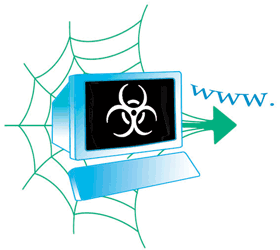|
Monsanto's World Wide Web of
Deceit
Excerpts from
Kara Platoni, East
Bay Express, May 29, 2002
....until after Nature recanted
the study, much of the debate played out in scientific publications and
on the Internet. One major online forum was the site of AgBioWorld Foundation,
run by C.S. Prakash, a plant molecular genetics professor at Tuskegee University
and vocal supporter of genetic engineering.
AgBioWorld.org became a forum for
critics of the Berkeley study; Prakash would post critical articles, such
as an editorial in the journal Transgenic Research that called the research
"a testimony to technical failure." Prakash also posted his own series
of press releases, arguing that "organizations with vested interests and
hidden agendas have used these tenuous claims and a campaign of hysteria
to discredit modern biotechnology" and that Mexican farmers would suffer
if denied the technology available to their American counterparts..
But there's evidence that some
of the most virulent criticisms posted on the site were anything but academic.
Following an April investigation by the British weekly The
Big Issue, both The Ecologist and The
Guardian have followed with articles alleging that AgBioWorld's Web
forum, AgBioView, was used as part of a corporate smear campaign against
Quist and Chapela.
At issue are the identities of
e-mail contributors Mary Murphy and Andura Smetacek, who together submitted
sixty of the first postings criticizing the study and dismissing Chapela
as an anti-biotech activist. According to Ecologist
columnist Jonathan Matthews, one of Murphy's e-mail addresses revealed
that she worked for the Bivings Group, a Beltway PR firm specializing in
'Internet advocacy' campaigns. One of Bivings' big clients? Monsanto, the
company from which Pharmacia was germinated. Smetacek's identity is a bit
more nebulous. After unsuccessfully trying to track her down, Big Issue
writer Andy Rowell concluded that Smetacek's
e-mail address was a front. But who was behind it? Neither publication
could say, but both noted that Smetacek's postings made frequent reference
to the Center for Food and Agricultural Research, an entity that appears
to exist only online and whose domain, they claim, is registered to a Bivings
employee.
A spokesman for the Bivings Group
emphatically denies that the company has ever employed -- or heard of --
either Murphy or Smetacek, and in a terse press release the PR group dismisses
the magazines' allegations as "baseless." Likewise, AgBioWorld founder
Prakash says he has no knowledge of either woman, but that as a discussion-group
moderator it can be tricky to draw the line between people who are just
opinionated and those who are passing off unsubstantiated information as
fact. "The Internet is not a newspaper; you really have to take things
with a grain of salt," he says. He also maintains that his site has no
connection with Bivings or any other industry organizations. "It's a very
independent nonprofit organization," says Prakash.
Quist and Chapela's defenders hold
that these attacks on their credibility were not at all impartial. The
Bivings Group's own Web site, after all, boasts of the power of "viral
marketing," or using word-of-mouth strategies to disseminate clients' views
online. Indeed, Andrew Dimock, head of the PR firm's online marketing and
promotions division, penned an essay on the topic that appeared in April
on Thebivingsreport.com. Following publication of the Guardian article,
Dimock's essay was amended to eliminate the following quotation: "There
are some campaigns where it would be undesirable or even disastrous to
let the audience know that your organization is directly involved. ...
Message boards, chat rooms, and listservs are a great way to anonymously
monitor what is being said. Once you are plugged into this world, it is
possible to make postings to these outlets that present your position as
an uninvolved third party."
The currently posted version instead
suggests that people use message boards to "make relevant postings to these
outlets that openly present your identity and position." Even more disturbing,
says columnist Matthews, is his claim that when
searching the AgBioWorld Web archive, he got an error message showing that
the site was connected to a Bivings server. "This suggests that Bivings
may not just be contributing significantly to the tone and direction of
the AgBioView list in an undisclosed way through the use of one or more
aliases, but are making some of AgBioWorld's content available in a way
that masks their involvement," he says. All attempts by the Express to
reach Murphy and Smetacek through phone numbers and e-mail addresses provided
by Rowell proved fruitless.
Even if the fronts were false,
the criticism was effective in refocusing the debate on lab methodology.
Defenders of the Berkeley research charge that its detractors are trying
to obfuscate the fact that the study's main point -- transgenes have made
their way into Oaxacan corn -- is probably correct. "They're spending big
bucks to confuse the public and attempt to destroy the credibility of these
two researchers," says Greenpeace's Merrill. Chapela concurs. "The people
who are publicly after us right now are the usual suspects, the people
who are in the pay of the industry and whose dedication is just to produce
propaganda," he says. "They basically fed us to the dogs."
|
 |
|||